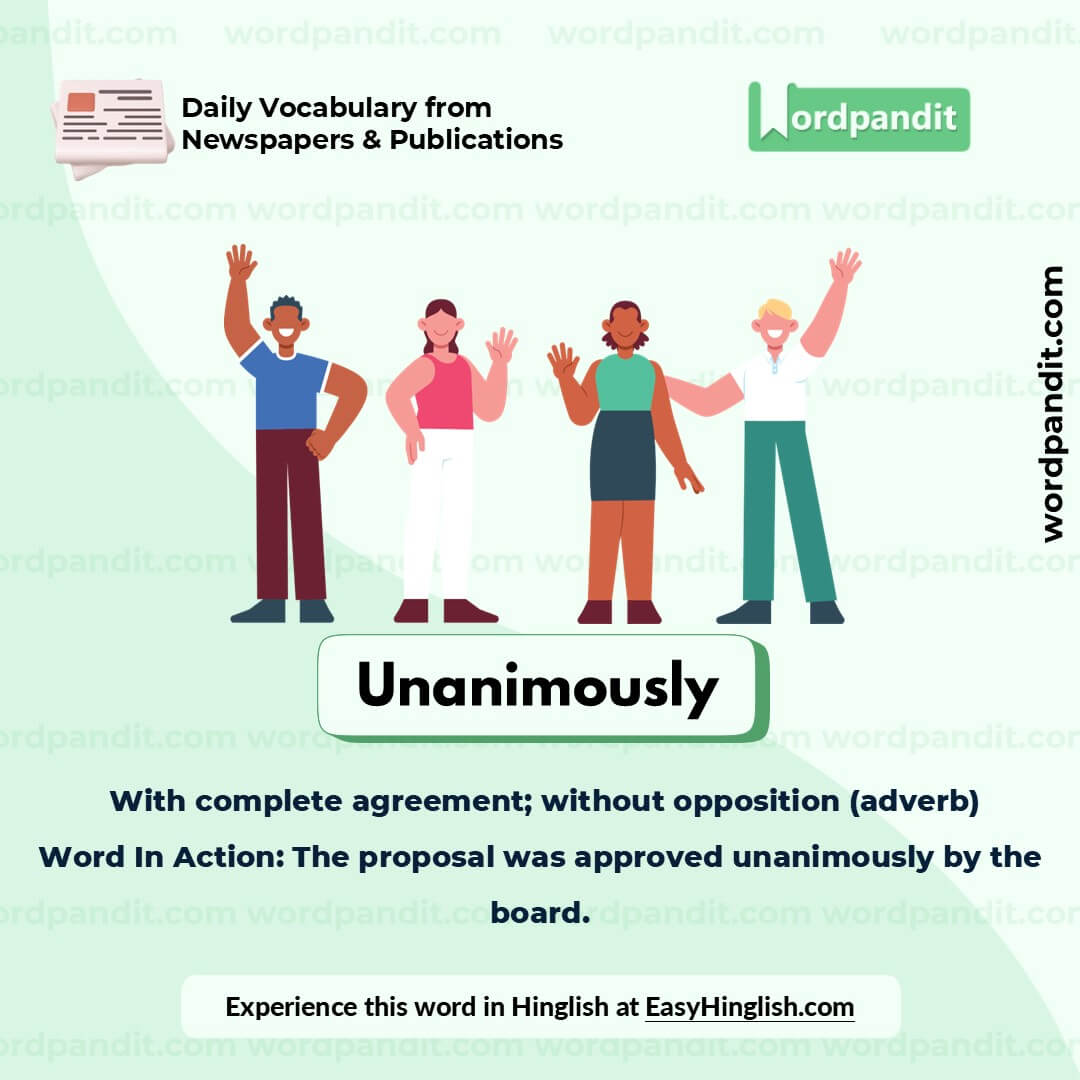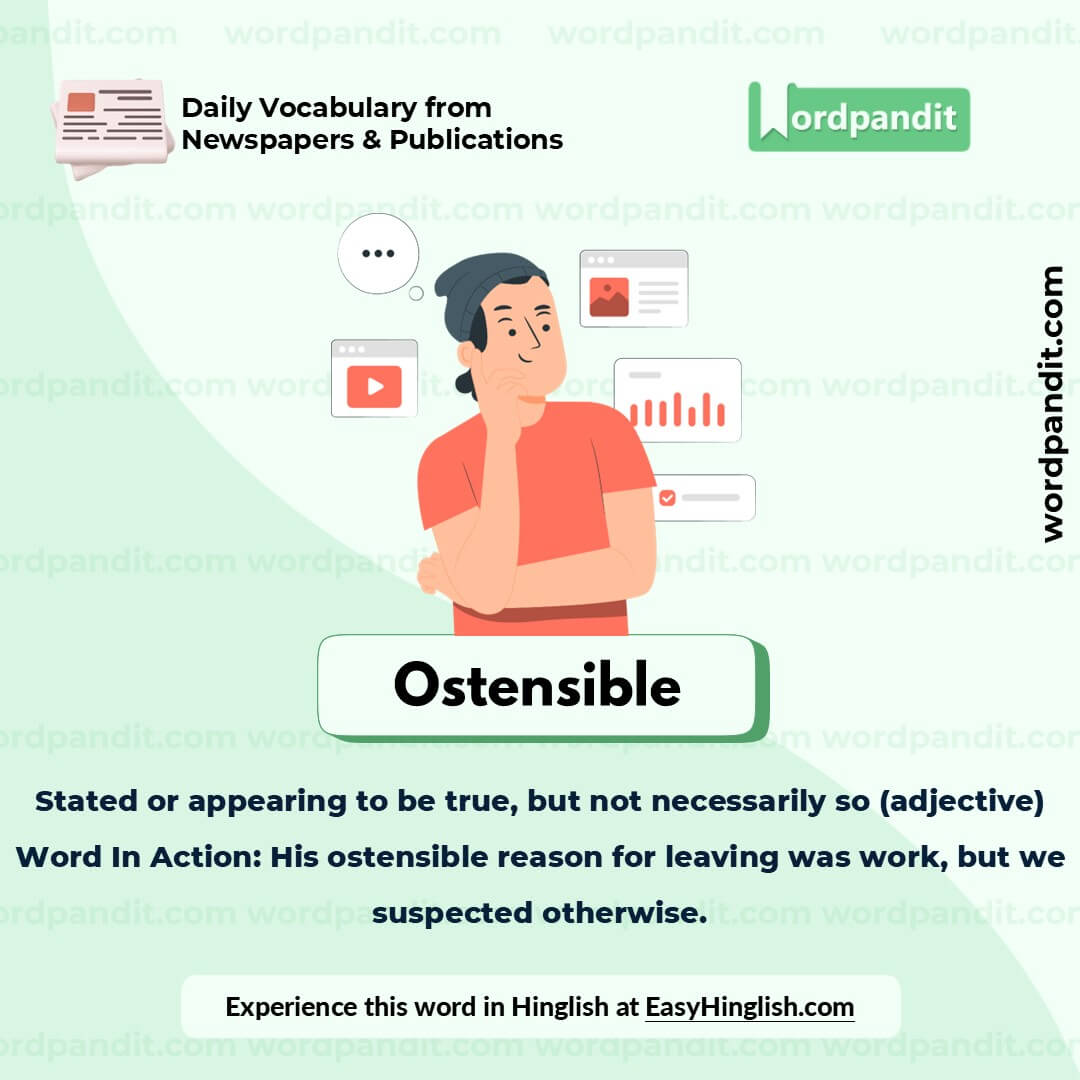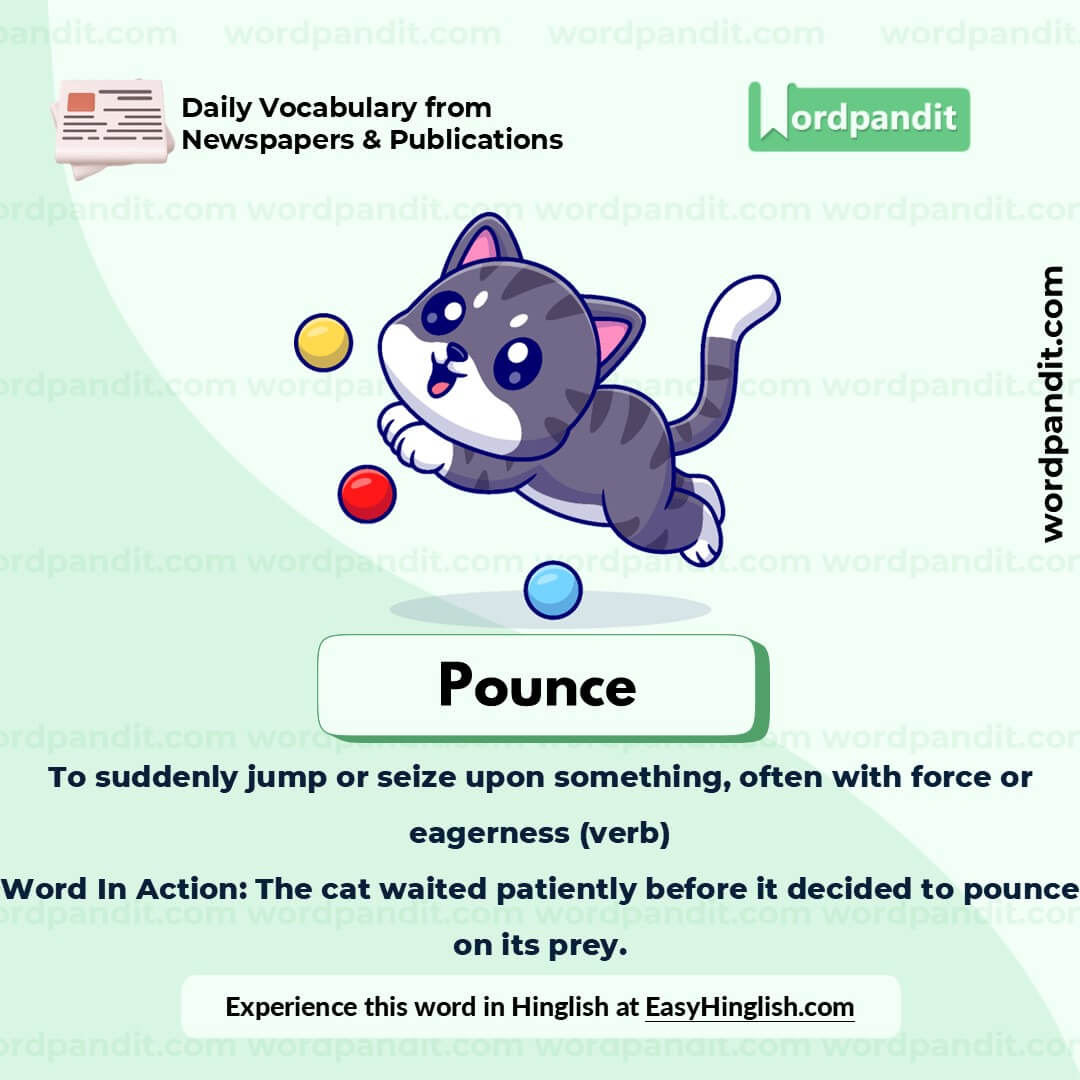Daily Vocabulary from Indian Newspapers and Publications
Welcome to Wordpandit’s Indian Vocabulary Hub
At Wordpandit, we understand the importance of staying rooted in the local context while expanding your language skills. This section focuses on enriching your vocabulary with words and phrases drawn from India’s leading newspapers and publications, ensuring you're learning vocabulary that is practical, relevant, and uniquely Indian.
Why Indian Sources Matter
We believe that the best way to master any language is by immersing yourself in local content. That’s why we carefully curate vocabulary from top Indian publications, including:
- The Hindu
- The Times of India
- The Economic Times
- Hindustan Times
- Live Mint
- The Indian Express
- And many others...
Stay Updated, Stay Relevant
With daily updates from Indian news sources, you’ll be consistently learning words that reflect the trends and shifts in Indian society and culture. Our focus is to provide vocabulary that enhances your understanding of the language in an Indian context.
How Wordpandit Supports Your Goals
Whether you’re preparing for exams, aiming to improve your professional communication, or simply want to stay connected with the latest Indian vocabulary, Wordpandit is here to guide you every step of the way.
Learn with a Practical Approach
Our interactive learning methodology includes real-world examples, engaging activities, and context-specific usage to ensure that every word becomes part of your active vocabulary.
Dive into Indian Vocabulary Today!
Why Choose Wordpandit?
Practical Learning: Focus on words you'll actually encounter in real-world reading, enhancing your comprehension and communication skills.
Diverse Content: From current affairs to scientific breakthroughs, our varied sources expose you to vocabulary across multiple domains.
Effortless Integration: Make Wordpandit a part of your daily routine. Just a few minutes each day can significantly boost your lexicon over time.
Your Path to Vocabulary Mastery
- Visit our Daily Vocabulary section regularly
- Explore new words and their usage in context
- Practice incorporating these words into your own writing and speech
- Track your progress as your vocabulary expands
Start Your Journey Today
Embark on your vocabulary enhancement journey with Wordpandit. By consistently engaging with our daily posts, you'll build a robust vocabulary that serves you well in academic, professional, and personal contexts.
Remember, a word a day keeps linguistic limitations at bay. Make Wordpandit your daily companion in the quest for vocabulary excellence!
WORD-1: Monologue
Context:
"Reporting there felt like covering a monologue." - The Hindu
Explanatory Paragraph:
A monologue is a long speech delivered by one person, either in a play, conversation, or presentation. It can often feel like a one-sided exchange where the speaker dominates, leaving little room for others to contribute. In this context, it implies that the reporting was like hearing a single voice speak continuously without interaction.
Meaning: A long speech by one person during a conversation or in a theatrical context (noun)
Pronunciation: MON-uh-log
Difficulty Level: ⭐⭐ (Intermediate)
Etymology: From Greek monologos, meaning "speaking alone"
Synonyms & Antonyms:
Synonyms: soliloquy, speech, oration, address
Antonyms: dialogue, conversation, discussion
Usage Examples:
- The actor delivered a powerful monologue that captivated the audience.
- She went on a long monologue about her day without letting anyone else speak.
- In literature, a monologue is often used to reveal a character's inner thoughts.
- The meeting felt more like a monologue than a discussion, as no one else had a chance to contribute.
Cultural Reference:
"Hamlet's 'To be, or not to be' is one of the most famous monologues in literary history." - William Shakespeare
Think About It:
Why do you think monologues are so effective in theater and storytelling?
Quick Activity:
Write your own short monologue about a topic you are passionate about. Try to express your thoughts without needing a response.
Memory Tip:
Remember "mono" means "one" and "logue" means "speech," so a monologue is a speech by one person.
Real-World Application:
Monologues are not just for plays—they are used in presentations, debates, and even one-sided conversations, where one person takes the stage to express ideas.
WORD-2: Unanimously
Context:
"The Linguistics Experts Committee in a meeting on July 25 unanimously revised the criteria." - The Hindu
Explanatory Paragraph:
The word unanimously refers to a decision or action that is agreed upon by everyone involved, without any dissenting opinions. When something is decided unanimously, it means that all parties are in complete agreement, reflecting a strong consensus.
Meaning: With complete agreement; without opposition (adverb)
Pronunciation: yoo-NAN-uh-muhs-lee
Difficulty Level: ⭐⭐ (Intermediate)
Etymology: From Latin unanimus, meaning "of one mind"
Synonyms & Antonyms:
Synonyms: collectively, universally, consensually
Antonyms: divisively, discordantly, controversially
Usage Examples:
- The board members voted unanimously to approve the new policy.
- The jury reached a unanimous decision after just an hour of deliberation.
- The committee unanimously agreed that changes were necessary to the project plan.
- The law was passed unanimously by the council with no objections.
Cultural Reference:
"In the United Nations, certain resolutions are passed unanimously when all member countries agree." - Global Politics
Think About It:
Why do you think it's important for certain decisions, like those in courts or international agreements, to be made unanimously?
Quick Activity:
Think of a time when a group you were in reached a unanimous decision. What made it easy or difficult for everyone to agree?
Memory Tip:
Unanimously comes from "unanimous," which means "one mind"—just remember that everyone in the room has the same opinion.
Real-World Application:
In real life, "unanimously" is often used in voting contexts—whether in meetings, courts, or elections—when every participant agrees on the same decision or outcome.
WORD-3: Whirlwind
Context:
"Journalists were caught in a whirlwind of press conferences, statements, and counter-statements." - The Hindu
Explanatory Paragraph:
A whirlwind refers to a rapidly rotating column of air, but it is also used metaphorically to describe a chaotic situation where events or activities happen very quickly and intensely. In this context, the journalists experienced a flurry of fast-paced, overwhelming events.
Meaning: A situation or series of events where many things happen quickly (noun)
Pronunciation: WHURL-wind
Difficulty Level: ⭐⭐⭐ (Intermediate)
Etymology: From Old English whirlegig, meaning "whirling top"
Synonyms & Antonyms:
Synonyms: frenzy, tumult, storm, flurry, maelstrom
Antonyms: calm, tranquility, order, peace
Usage Examples:
- The whirlwind of emotions left her feeling exhausted after the event.
- The company faced a whirlwind of changes after the new CEO took charge.
- The newlyweds were swept up in a whirlwind of celebrations and parties.
- After the scandal, the politician faced a whirlwind of media attention.
Cultural Reference:
"In 'The Wizard of Oz,' Dorothy is swept away by a literal whirlwind to the magical land of Oz." - American Cinema
Think About It:
Have you ever experienced a time in your life that felt like a whirlwind? How did you handle the rush of events?
Quick Activity:
Describe a day when you felt like you were in a whirlwind of activity. How did you manage all the tasks?
Memory Tip:
Picture a spinning whirlwind of air to remember that "whirlwind" can describe both a literal storm and a chaotic situation.
Real-World Application:
The word "whirlwind" is often used to describe busy, fast-paced periods in life—whether in business, personal life, or media events, where activities happen all at once.
WORD-4: Ostensible
Context:
"The ostensible reason for his release is that...he commands pockets of support and influence." - The Hindu
Explanatory Paragraph:
The word ostensible refers to something that appears to be true or is presented as the reason for an action, but which might hide the true, underlying motive. In this context, it implies that the stated reason for the release may not be the actual reason, suggesting a possible hidden agenda.
Meaning: Stated or appearing to be true, but not necessarily so (adjective)
Pronunciation: os-TEN-suh-buhl
Difficulty Level: ⭐⭐⭐ (Advanced)
Etymology: From French ostensible and Latin ostensibilis, meaning "capable of being shown"
Synonyms & Antonyms:
Synonyms: apparent, supposed, outward, alleged, professed
Antonyms: genuine, real, actual, hidden
Usage Examples:
- The ostensible purpose of the meeting was to discuss the budget, but it soon turned into a debate about office politics.
- Her ostensible reason for leaving was to take care of her family, though many believed she was pursuing other career opportunities.
- The company's ostensible commitment to environmental causes was questioned when its factory was found to be polluting the nearby river.
- While the ostensible goal was peace, there were deeper political motives driving the negotiations.
Cultural Reference:
"In George Orwell's '1984', the government's ostensible reason for its strict surveillance was national security, but its real motive was to control and manipulate the populace." - Classic Literature
Think About It:
Why do you think people or organizations often provide ostensible reasons for their actions instead of being transparent about their true motives?
Quick Activity:
Think of a situation where the ostensible reason for an action differed from the true reason. Write about the difference between the two.
Memory Tip:
Remember that "ostensible" comes from the idea of something being "shown"—but not necessarily the full truth. It's like a cover story hiding what's real.
Real-World Application:
Ostensible is often used in politics, business, and media to describe actions or reasons that are publicly stated but are believed to conceal the true motives.
WORD-5: Pounce
Context:
"The Opposition was quick to pounce, alleging corruption in the statue’s construction." - The Hindu
Explanatory Paragraph:
The word pounce is often used to describe the sudden, aggressive action of an animal leaping to catch its prey. In a metaphorical sense, it means to quickly take advantage of an opportunity, usually in a critical or negative way. In this context, it suggests that the opposition swiftly seized the chance to make allegations of corruption.
Meaning: To suddenly jump or seize upon something, often with force or eagerness (verb)
Pronunciation: powns
Difficulty Level: ⭐⭐ (Intermediate)
Etymology: From Middle French ponce, meaning "to grip or seize"
Synonyms & Antonyms:
Synonyms: leap, seize, attack, spring, jump
Antonyms: hesitate, delay, withdraw, retreat
Usage Examples:
- The cat waited in silence, ready to pounce on the unsuspecting mouse.
- The media was quick to pounce on the politician's controversial comments.
- Investors pounced on the opportunity to buy stocks at a low price after the market crash.
- She pounced on her opponent's mistake to win the game.
Cultural Reference:
"In many wildlife documentaries, predators like lions or leopards are shown as they pounce on their prey with incredible speed and precision." - Nature Documentaries
Think About It:
Why do you think people are quick to pounce on the mistakes or missteps of others, especially in public or political contexts?
Quick Activity:
Write about a time when you "pounced" on an opportunity. What was the situation, and how did your quick action affect the outcome?
Memory Tip:
To remember "pounce," think of a cat suddenly leaping on a target—quick, forceful, and determined.
Real-World Application:
In everyday life, "pounce" can describe taking advantage of sudden opportunities or responding swiftly to situations, especially in business, media, or personal interactions.


















